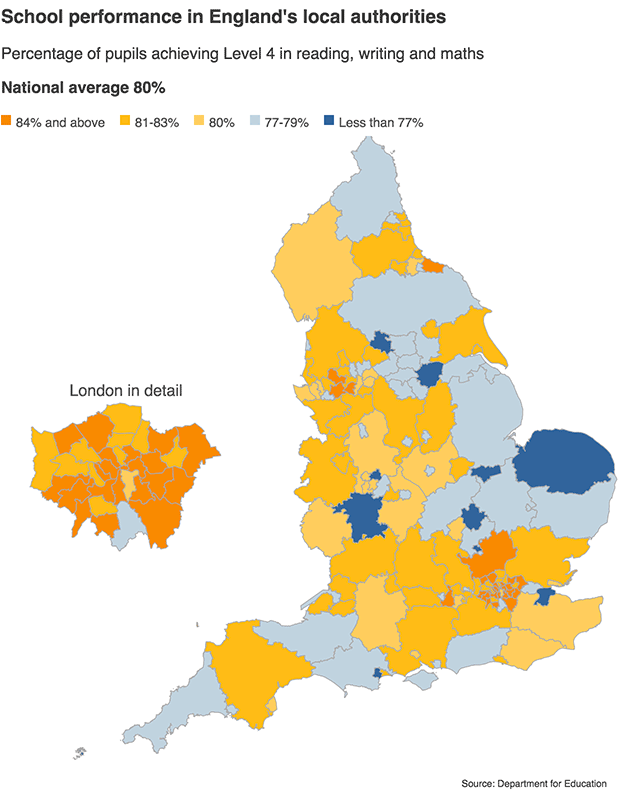More primary schools succeed in 'three Rs'
- Published
- comments

The Department for Education is publishing league-table data for England's primary schools
There has been another slight rise in the number of children leaving England's primary schools with a good grasp of the "three Rs", data shows.
In 2015, 80% of Year 6 pupils achieved Level 4 in maths, reading and writing, up from 78% last year.
Improvements for disadvantaged pupils also continued, with 70% reaching the expected level in the basics, up three percentage points on 2014.
Ministers said 90,000 more 11-year-olds than in 2010 had a "good grounding".
The Department for Education said the results showed schools across the country were "rising to the challenge of raised standards and expectations for all pupils".
The assertion comes as the government publishes data - or league tables - detailing schools' performance in national curriculum tests, often known as Sats, taken by Year 6 pupils in the summer term.
Tap here, external to search for the results for your area.

The league tables measure progress from infants through to the end of primary
The performance tables show the number of schools below the government's "floor standard" has fallen by 92 since last year, with 676 failing to meet the expected levels, compared with 768 in 2014.
Schools are considered to be underperforming if fewer than 65% of Year 6 pupils get Level 4 in reading, writing and maths and if pupils are not making the expected progress in these subjects between the end of Year 2 (age six or seven) and the end of Year 6 (age 10 or 11).
The statistics also show:
Nearly one in four Year 6 pupils in England (24%) gained a Level 5 (the expected level for a 13-year-old) or above in reading, maths and writing
Of those pupils who started junior school (Year 3) with higher than average attainment, 99% went on to get Level 4 in English, maths and writing at the end of Year 6
The improved results for disadvantaged children (those who qualify for free school meals) this summer builds on an increase of four percentage points between 2013 and 2014
Among pupils with English as an additional language, 77% reached Level 4 in all three areas, while 21% got a Level 5
Attainment in the grammar, punctuation and spelling test improved from 76% in 2014 to 80% in 2015
Kensington and Chelsea - where 91% of pupils achieved Level 4 in all three areas - was the best-performing local authority
The Isles of Scilly was the poorest-performing local authority, with 69% of pupils meeting the expected target, followed by Medway and Poole, both with 73% of pupils making the grade

Level 4 indicates children can spell, start to use grammatically complex sentences and use joined-up handwriting.
In maths, they must be are able to multiply and divide whole numbers and use simple fractions and percentages, among other things.
Schools Minister Nick Gibb said: "It is essential that every child leaves primary school having mastered the basics in reading, writing and maths - thanks to our education reforms, thousands more pupils each year are reaching those standards.
"The increased performance at primary level across the country demonstrates how this government is delivering on its commitment to provide educational excellence everywhere and ensure every child benefits from the best possible start in life, no matter where they come from."
Sir Kevan Collins, chief executive of the Education Endowment Foundation, said: "The fact that many more disadvantaged primary school pupils are achieving good results is testament to the hard work and dedication of teachers and school leaders across the country."
Dr Mary Bousted, general secretary of the Association of Teachers and Lecturers, said: "We have a world class primary education system in England and urge the government to re-think its approach to reforming primary education.
"Introducing unhelpful and unnecessary measures, such as forcing schools to become academies and naming and shaming 'underperforming' local areas, puts at risk the progress being made with our children in primary schools."
NUT general secretary Christine Blower said: "Children are more than a number. Each one develops at different levels and at different stages in their school career.
"An exam factory culture takes the joy out of discovering and gaining knowledge and can reduce school to a series of grinding test practices.
"The fact that maintained schools and converter academies' results have improved at exactly the same rate over the past four years - 5 percentage points - has been completely ignored. This exposes the inconvenient truth that school structures do not drive improvement."
- Published29 January 2015
